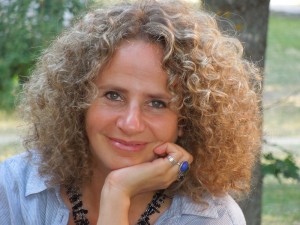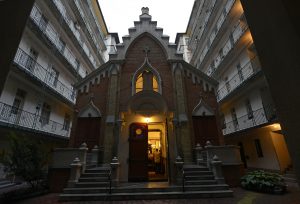Author of Bee Jewish Interactive Children’s Books: Linda Verő-Bán
 Linda Verő-Bán was born in 1976 in Budapest, Hungary. Linda was among the first ones who rebuilt the Jewish life in Budapest as a teenager after the Communist era. She graduated in Art History at the Hebrew University of Jerusalem, Israel and studied Jewish studies at Paideia in Stockholm, Sweden.
Linda Verő-Bán was born in 1976 in Budapest, Hungary. Linda was among the first ones who rebuilt the Jewish life in Budapest as a teenager after the Communist era. She graduated in Art History at the Hebrew University of Jerusalem, Israel and studied Jewish studies at Paideia in Stockholm, Sweden.
Linda is the director of the Hillel Foundation Budapest and working on informal Jewish educational programs. She is organizing the Sunday School and Family Kabalat Shabbat program of the Frankel Synagogue where she also holds the rebbetzen status.
Linda started to write and publish interactive Jewish children’s books in 2007 because she felt the lack of modern Jewish children’s books in Hungarian.
With Bee Jewish Books (Zsidongó books) Linda created a an outstanding Jewish children’s book series and helped thousands of Jewish family to learn and talk about Judaism in a pluralistic and fun way. The books are translated to seven languages. She is making workshops and book signing events and activities based on her books.
Introduction video of Linda Verő-Bán
ARTICLES:
English
JerusalemPost (December, 2013)
Jewish Book Council (2013) – Hello God!
Huffingtonpost (2010) – What Does It Mean To Be Jewish?
http://www.timesofisrael.com/young-families-bringing-new-life-to-budapest-synagogues/
Jüdische Allgemeine (2013) – Was Bedeutet Es Jüdisch Zu Sein?
Kurier (2013) – Interaktive Haggada
Wiener Zeitunk (2013) – Was Bedeutet Es Jüdisch Zu Sein?
… “BUDAPEST (JTA) — Linda Ban is a rebbetzin, but with a mass of curly hair and chunky rings on the fingers of both hands, she hardly fits the stereotype of a Central European rabbi’s wife.
A mother of two in her mid-30s, Ban is married to Tamas Vero, the 38-year-old spiritual leader of Budapest’s Frankel Leo Street Synagogue, a neo-Gothic building hidden in a courtyard near the Danube.
The congregation may hold a key to the Jewish future in Hungary.
“My husband and I are building a Jewish community at our synagogue,” Ban says. “But my goal is that our members take Judaism home — into their homes.”
Frankel Leo is among a handful of Budapest synagogues that has seen an upsurge of membership and communal engagement in recent years thanks to active young rabbis and a family-friendly focus.”
…” Most of the congregants at Frankel Leo are young couples and families who joined Jewish youth organizations and went to the Szarvas Jewish summer camp as children and teens but had little else to do with organized Jewish life afterward. Now that they are married and have children, said Linda Ban, they are coming back.
“Our congregation is totally based on people we knew at Szarvas or other youth activities, but some of them we haven’t seen for 15 years,” she said. “When they become a family, they want to be Jewish again. But they don’t know how to bring Judaism home, how to have a Jewish home. And I find that sad.”
A rarity in Hungary, Ban and her husband both grew up in traditional Jewish homes. They use their own lives and upbringings as examples in their teaching of Jewish values, traditions and culture to the young families now joining their congregation.
In particular, Ban has incorporated her own family history and experiences in a series of illustrated children’s books that explain and explore Jews, Jewishness and Judaism in simple yet meaningful terms geared toward everyone in any extended modern family.
“Countless parents have difficulty talking to children about Judaism because they are full of unanswered questions themselves,” she wrote in “What Does It Mean to Be Jewish,” one of her books that also was published in an English-language edition.
“I would like to create opportunities,” she wrote, “for all members of the family — grandparents, parents, step-parents and children, Jews and non-Jews, believers and non-believers alike — to talk to each other openly and honestly about Judaism, without taboos, expectations or prescribed answers.”



